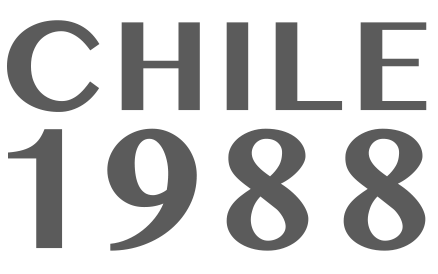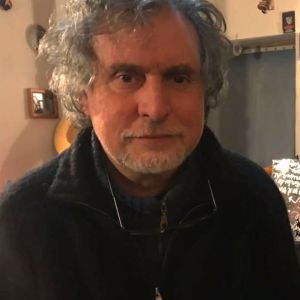The arrival of that day, the plebiscite, in my case, was quite planned and it was like the culmination of many years in which one dreamed of such a situation. I don’t know if it was a plebiscite specifically or a slightly more violent outcome. One dreamt of the possibility that this would end or at least alleviate. And the plebiscite was a way of finding relief. And, for the same reason, it was equally exciting. There were expectations, there was uncertainty as well. So when one reached that day, it was a day when one knew it was another day of responsibility. In my case, I had been involved in activism during the dictatorship. Therefore, that day was the culmination of years of activism. So, there was work to be done on that day just like any other day. The work was quite simple, clear, and obvious. It involved monitoring and simultaneously counting the votes, the ballots, to prevent fraud. And that was beautiful because I believe it was the first truly collective activity, organically planned and open, so to speak, because everything else was more closed, involving secrecy and clandestine operations. The other possibility was participating in public demonstrations, but this was a coordinated public demonstration with planning that entailed a whole sequence of events, which was being present at the voting tables, monitoring the votes for “Yes” and “No.” Then a messenger on a bicycle would take the ballots by neighborhood, by district, and they would arrive at houses. I remember being in a house and we would note down what was coming in. So, in that sense, it was a contained excitement, and it felt like revolutionary bureaucracy, in the revolutionary sense of generating change. And when we reached the vote count and saw that “NO” was indeed winning, the emotion grew, but so did the uncertainty because we didn’t know what would happen, especially when rumors started circulating that the true result wouldn’t be recognized, so to speak. Especially when Cardemil announced, as the Secretary of Information, the Secretary General of the Republic responsible for providing the first results, and the initial count was based on 0.0009% of the votes counted—which is ridiculous—and, of course, “Yes” was winning, but it was an extremely small percentage of the population. Then another publication came out, which was a bit larger, and “Yes” was still winning. So, the situation began to worry us because if it continued like that, with “Yes” in the lead, it would result in widespread fraud. Then, rapidly and simultaneously, and this is very good, a kind of “simultaneous government” was formed, in quotation marks, in which some dissident radio stations were also broadcasting a completely different count with “No” in the lead. It was so overwhelming that Matthei had to finally acknowledge that “No” was indeed winning, despite Pinochet’s anger and all that. But that’s well-known, all of that is well-known.
But internally, what I experienced was almost the natural culmination of something I had been doing, but I never thought it would become a reality at some point. Moreover, I had been directly involved in the plebiscite through the campaign, through the political campaign in which I participated. That was very exciting because, when I saw it on television – on the first day, I remember – when I saw it on television, a public space on television – a mass public medium – a space where the dissent was being expressed, where it was being acknowledged that there was a different option to the dictatorship, for the first time on a massive scale, so to speak, on television. It was truly something that, even though I knew it would be broadcasted on television, when I saw it on TV on the first day, the opening, it brought tremendous emotion because it was an indescribable achievement. We even held the phone to relatives who were in exile so they could hear that, through television, a mass medium, for the first time, an option contrary to the dictatorship was having its voice.
And I believe that was, you know, not sure if crucial, but very important. If the campaign hadn’t been broadcasted on television, I don’t know if we would have won, you know. The fear was so great, and the paranoia was so intense that many even thought they were being watched at the voting booth, in the cubicle where they were casting their vote. One felt pursued, monitored. In the dictatorship, surveillance is ingrained, it’s internalized. Therefore, it wasn’t easy to counteract that, to fight against it. And television was very important. Why? Because what people see on television, especially in a dictatorship, is what is legitimized. In other words, television gives you permission, and if the No option was being shown on television, it meant that it was possible, that it could happen. It wasn’t so terrible anymore. In a way, television, as a support, legitimized the No option. And I think that was very significant, they didn’t think about it, you know. Or some who wanted the dictatorship to end for a more political transition because they saw that the situation was very tense, they didn’t want to say it. In fact, they told Pinochet that it would be an easy win. But I believe television played a crucial role in that because what you saw on television was what was considered legitimate, what was right. And people felt somewhat reassured, I think. They saw the No option, a legitimate possibility that wasn’t in conflict with the system, so to speak. Obviously, it wasn’t so clear-cut, but it helped a lot.
So, when I saw the campaign for the first time, I started to have confidence, and also a great sense of excitement for being involved there and being closer to the people. I think television also created relief and a sense of closeness among those people who wanted to end the dictatorship but didn’t dare to speak up. People started to talk a little more because television allowed it.
So, when the day of the plebiscite arrived, I came with the emotions from the campaign and with high expectations, enthusiasm, and above all, that day was filled with great satisfaction because I was able to enjoy it deeply, like when you do a play or participate in teamwork, except that the repercussion of this was fundamental, it was the destiny of the country. And just as that small team was forming there, working valiantly, rigorously, and with several generations from 18, 20 years old to 60, 70 years old, we were there generationally, just as that small team was there, there were thousands of teams scattered in homes, an alternative way to ensure there was no fraud. It was exciting, like a study trip, something like that. We were also doing something like a deed. Well, the next day was a night and day of celebration, of relief. And of course, with the opening of that floodgate, other ways of relating to coworkers, friends, or people with whom one had less confidence were also opened up. One reconnects with a part of that country that was left behind before the dictatorship.


